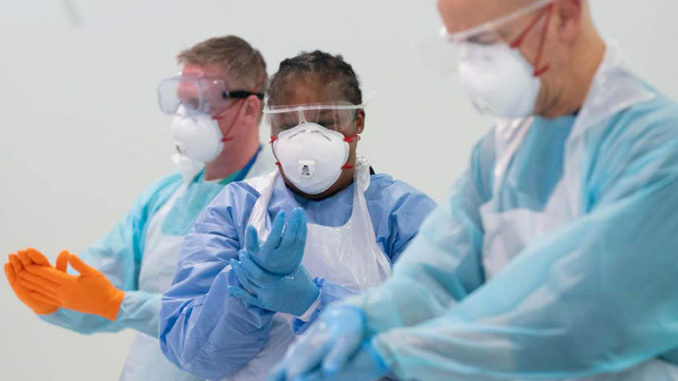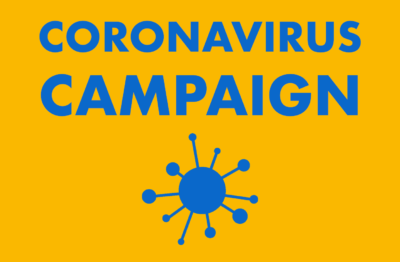
‘Exposed, silenced, attacked: failures to protect health and essential workers during the COVID-19 pandemic’.
This timely and shocking report compiled by Amnesty International opens with the stark figure of 3000 health workers losing their lives due to the global COVID-19 pandemic up to the time of writing, with a warning that this figure:
“ . . . is likely to be a major underestimate given a lack of reporting . . . many others have worked in unsafe environments due to shortages in personal protective equipment (PPE). They have further faced reprisals from the authorities and their employers for raising safety concerns, including arrests and dismissals, and even in some cases been subjected to violence and stigma from members of the public”.
While in many countries there is no systematic tracking of how many health and essential workers have contracted COVID-19 and died as a result, the International Council of Nurses estimates that more than 230,000 health care workers have contracted the disease, and more than 600 nurses died. According to a survey published in May 2020 by Public Services International, in 62 countries, less than a quarter of trade unions reported having adequate equipment. Workers who have spoken out have in some countries faced dismissal and arrest or been threatened with reprisals. In addition, there have been health and essential workers who have faced stigma and violence. The report looks at concerns around occupational health and safety, retaliation, and problems of violence and stigma directed at health and other essential workers. It also flags some broader structural issues in health and social support systems across the world that have exacerbated these issues and require urgent attention.
What does the report tell us about the situation in the UK?
Increased risk of death compared with the general working population has been shown for male and female nurses, male nursing auxiliaries and assistants, male and female social care workers and male health care workers. Other occupations with raised death rates for men included taxi drivers and chauffeurs, bus and coach drivers, workers in factories, and security guards. As of 26 June 2020, 268 deaths involving COVID-19 had been registered among social care workers, and 272 deaths amongst health workers, in England and Wales. It is now well established that BAME health workers (that is, health workers who identify as black, Asian, or minority ethnic), are significantly over-represented in the total number of COVID-19 related deaths, with up to 60% of health workers who died coming from BAME communities.
The British Medical Association carried out a survey with over 16,000 doctors in the UK on the question of adequate PPE in April 2020. Around 48% of respondents reported buying PPE for their own use or that of their department, or using donated PPE, due to lack of supplies where they worked. Overall, 65% of doctors said they felt either “partly or not at all protected”. The UK is one of at least eight countries in which health workers have appealed for help through the courts by launching legal challenges over inadequate supplies.
Workload and mental health concerns
Amnesty has collected moving testimony from health care workers, giving a vivid insight into stresses at work. This is a quote from a nurse in the UK:
“In terms of what it’s like at the moment, every day is like running on a treadmill with the speed set on high and you trying to keep your pace, everyone is tired and anxious. As ITU nurses we’ve gone from having one patient to having 3-5. We’ve got amazing colleagues from other parts of the hospital coming to help us, but they’re anxious being in this environment and need a lot of support and guidance that we can’t give. It’s emotionally exhausting; I’ve heard a son say goodbye to his mother over the phone, admitted a nurse from one of the wards and held her hand as she was put to sleep to be put on the ventilator and comforted a woman who lost her husband at the age of 40 leaving her to bring up two kids alone. I’ve cried a lot.”
Increased workloads and increased anxiety and stress are likely to exact a heavy toll on health and care workers, with depression, anxiety and insomnia now being commonly reported in Chinese staff. Failure to recompense workers for extra hours and workload adds further pressure. Porters, cleaners and social care staff were initially left out of a scheme under which families of health workers who died of COVID-19 were granted indefinite leave to remain in the UK although a campaign was successful in getting this amended to include them. For many workers who are outsourced there is the additional worry of not being paid for sick leave, or periods of self isolation crucial to controlling the spread of disease.
Workers have rights that must be respected
According to UN Special Rapporteurs:
“No worker is expendable. Every worker is essential, no matter what category is applied to them by States or businesses. Every worker has the right to be protected from exposure to hazards in the workplace, including the coronavirus . . . Our message today is simple, but crucial: every worker must be protected, no matter what”.
This damning report by Amnesty makes for grim reading but provides a voice for hard pressed health and care workers across the world, working under very different conditions but united by a common enemy and fighting against common problems. Governments must listen to the many recommendations set out, including the following:
- “States should ensure that employers provide all health and essential workers with adequate PPE to protect themselves during the COVID-19 pandemic, in line with international standards.
- States should recognise COVID-19 as an occupational disease, and workers who contract COVID-19 as a result of work-related activities should be entitled to cash compensation and medical and other necessary care.
- Health and essential workers’ safety concerns must be listened to and addressed in an appropriate manner. There must be no retaliation against workers for raising concerns or lodging a complaint related to health and safety.
- Comprehensive, effective and independent reviews should be carried out regarding states’ and other actors’ preparedness for and responses to the pandemic. Where there is cause to believe that government agencies did not adequately protect human rights – including the rights of health and essential workers - in the context of the pandemic, states should provide effective and accessible remedies, including through thorough, credible, transparent, independent and impartial investigations into these allegations.
- States should collect and publish data by occupation, including categories of health and other essential workers who have been infected by COVID-19, and how many have died as a result, in order to ensure effective protection in the future.”
While busy rewriting history, blaming others for a disastrous response to the pandemic including ongoing serious failures, our government must heed these calls as well as being held to account. The pandemic is by no means over, and “no worker is expendable”.
John Puntis is Keep Our NHS Public's Co-Chair.







Leave a Reply